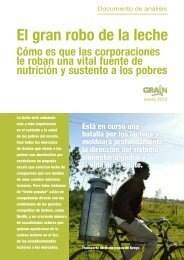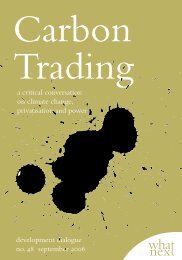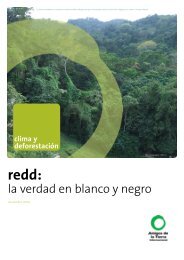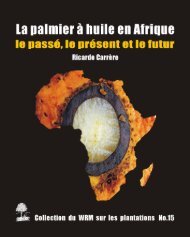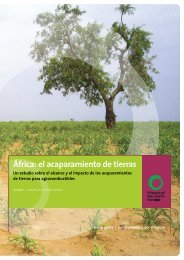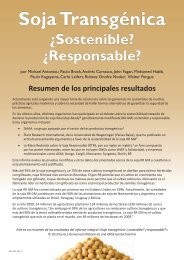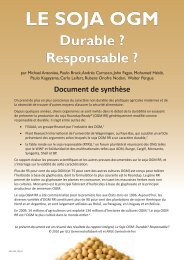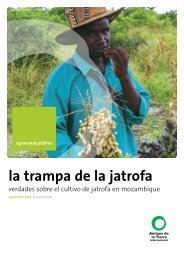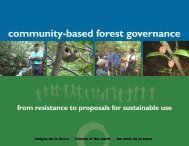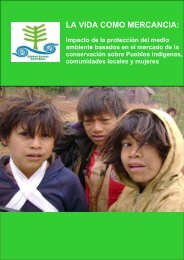Plantations, poverty and power - Critical Information Collective
Plantations, poverty and power - Critical Information Collective
Plantations, poverty and power - Critical Information Collective
You also want an ePaper? Increase the reach of your titles
YUMPU automatically turns print PDFs into web optimized ePapers that Google loves.
69<br />
of converting grassl<strong>and</strong>s to industrial tree plantations, stating instead that “Natural forests are not<br />
converted to plantations.” Carrere notes that “The certifiers appear to be totally uninterested in the fact<br />
that . . . grassl<strong>and</strong> areas would lose their original characteristics.”<br />
One of the problems associated with the plantations in Uruguay is an increase in wild boars, foxes <strong>and</strong><br />
venomous snakes. For sheep farmers this is a serious problem. The snakes have also killed pigs, calves,<br />
cows <strong>and</strong> even horses.<br />
WRM spoke to two ex-workers of Forestal Oriental who had developed allergic skin reactions to the<br />
chemicals they were employed to spray on the plantations. A current worker said that Forestal Oriental<br />
gave workers protective equipment, but most workers did not use it because it was uncomfortable. “With<br />
this heat, you try working with gloves on!” he said.<br />
WRM’s report notes that Forestal Oriental is among the most highly regarded employers in the plantation<br />
sector in Uruguay. But this is a result of government legislation, not FSC certification. Several people<br />
pointed out that working conditions had improved because the Ministry of Labour was monitoring<br />
compliance with labour legislation much more closely under the new government that came into <strong>power</strong> in<br />
March 2005. They commented that since 2005 workers could form unions whereas “before they weren’t<br />
allowed to form unions”.<br />
WRM’s researchers visited an area called Paraje Pence in the department of Soriano to investigate the<br />
impact of the plantations on water supply. “All the people here have been left with no water,” one of the<br />
local men told them. “I have a little bit but the well is dirty. Close to here where my father lives there’s no<br />
water at all.”<br />
Another villager told WRM, “I’ve lived here my whole life, <strong>and</strong> we never had any problems with water<br />
until they established all these plantations around eight years ago. Now we depend on the local<br />
government to bring us water.”<br />
A local nurse explained how the lack of water has serious health impacts:<br />
“The thing is that here, aside from the fact that people have been left without water in their wells, all of<br />
the freshwater ponds have disappeared too. So sometimes, when people have no water to wash their kids<br />
before bringing them to see the doctor, they just don’t bring them. There’s a girl who’s had lots of<br />
operations, <strong>and</strong> is still really weak. Last week she was supposed to come <strong>and</strong> see the doctor, but because<br />
the local authorities hadn’t delivered water for two weeks, she didn’t even have enough to wash her<br />
h<strong>and</strong>s, so she didn’t come.”<br />
FSC responded to WRM’s report not by investigating these problems, but by asking for a response from<br />
the certifying organisation, SGS. Under the FSC system, SGS is paid by the company it is certifying, in<br />
this case Forestal Oriental. Clearly it is not in SGS’s interest to delve too deeply into any of these issues.<br />
SGS’s response to FSC is not available to the public, but it was apparently enough to reassure FSC. “FSC<br />
guarantees peace of mind to consumers” was the headline of FSC’s press release. 343 While this may or<br />
343 Ricardo Carrere (2006) “Certified plantations in Uruguay: Can the FSC really guarantee peace of mind to<br />
consumers” World Rainforest Movement Bulletin 108, July 2006.



